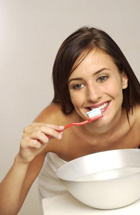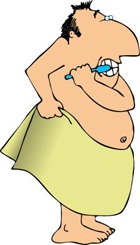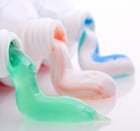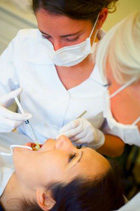 Bruxism is a disorder that affects many people and in most cases they are not even aware that they suffer from it. This disorder happens when a person gnashes his or her teeth while sleeping, leading to the teeth being ground down over a period of time, with the edges of the teeth getting blunted. The enamel of the teeth will get worn away leading to sensitivity of the teeth, dental decay and even fractures. The jaw of the person will also start to ache after a while. Since this becomes a habit, the problem will only escalate leading to problems that are very expensive to deal with.
Bruxism is a disorder that affects many people and in most cases they are not even aware that they suffer from it. This disorder happens when a person gnashes his or her teeth while sleeping, leading to the teeth being ground down over a period of time, with the edges of the teeth getting blunted. The enamel of the teeth will get worn away leading to sensitivity of the teeth, dental decay and even fractures. The jaw of the person will also start to ache after a while. Since this becomes a habit, the problem will only escalate leading to problems that are very expensive to deal with.
Since many people are unaware that they suffer from this problem, it can lead to serious dental problems over time. Certain symptoms that are associated with this condition include eating disorders, anxiety, insomnia and headaches. In extreme cases, it can also lead to arthritis. As a matter of fact, many people find out that they grind their teeth in their sleep only when their partner or parent finds out about it.
It is very important to diagnose this condition correctly so that the dentist can help you find a cure for it. A popular Leeds dentist says that only an examination by an experienced dentist will result in a correct diagnosis since there can be many other reasons for the tooth getting worn down, such as brushing very vigorously or drinking too many soft drinks. This underscores the need for regular dental examinations.





 Sleep apnea is a condition in which the person experiences small pauses in breathing during sleep. These pauses usually last for a few seconds to a minute at the maximum and can occur at least thirty times an hour resulting in poor sleep quality. This in turn leads to day time drowsiness often affecting social and professional life. But now you need to suffer with this condition; effective cure is available for sleep apnea in Leeds Central.
Sleep apnea is a condition in which the person experiences small pauses in breathing during sleep. These pauses usually last for a few seconds to a minute at the maximum and can occur at least thirty times an hour resulting in poor sleep quality. This in turn leads to day time drowsiness often affecting social and professional life. But now you need to suffer with this condition; effective cure is available for sleep apnea in Leeds Central. Acid production in the mouth is a major cause of bad breath, it isn’t the only cause but it is a good place to start, says a City ofl Leeds dentist. The worse time of the day is at night when you`re asleep, that’s when most damage is done to your teeth enamel from acid. The saliva gland stops working, and that allows your mouth to be used as an acid production factory by the bacteria that comes with your food. It is so important to clean your teeth, floss and rinse before going to bed; this will remove most of the food debris caught in between the teeth. The acid is produced by the bacteria feeding off the debris, with no saliva to neutralise it, it produces excessive amounts that then attacks the enamel. The acid also kills off the bacteria and this is then deposited onto the teeth as tartar, which is the hard, rough coating that your dentist will remove every 6 months on your check ups. Drinking water at night will also keep the acid at bay, then first thing in the morning rinse with a good mouth wash. If you do this as a regular regime, then bad breath will become a thing of the past and good riddance to it. During the day always give your teeth a quick flossing with a floss stick after every time you eat, and keep away from sugary drinks as they contain `food` in the form of sugar and fats for the bacteria to feed off.
Acid production in the mouth is a major cause of bad breath, it isn’t the only cause but it is a good place to start, says a City ofl Leeds dentist. The worse time of the day is at night when you`re asleep, that’s when most damage is done to your teeth enamel from acid. The saliva gland stops working, and that allows your mouth to be used as an acid production factory by the bacteria that comes with your food. It is so important to clean your teeth, floss and rinse before going to bed; this will remove most of the food debris caught in between the teeth. The acid is produced by the bacteria feeding off the debris, with no saliva to neutralise it, it produces excessive amounts that then attacks the enamel. The acid also kills off the bacteria and this is then deposited onto the teeth as tartar, which is the hard, rough coating that your dentist will remove every 6 months on your check ups. Drinking water at night will also keep the acid at bay, then first thing in the morning rinse with a good mouth wash. If you do this as a regular regime, then bad breath will become a thing of the past and good riddance to it. During the day always give your teeth a quick flossing with a floss stick after every time you eat, and keep away from sugary drinks as they contain `food` in the form of sugar and fats for the bacteria to feed off. At night when you sleep, so does your saliva gland, the mouth becomes dry and acid is produced which eats into your protective enamel, says a Central Leeds dentist. It also causes bad breath and that’s why we are so dehydrated in the mouth when we wake up. The acid that is produced by the bacteria dies and becomes tartar which is deposited around our teeth at gum level, and this too is a major cause of bad breath. Most people will take water to bed with them and sip it throughout the night, this neutralises the production of bacteria and acid, and with it bad breath and erosion. If we practice this throughout our day routine, that will also prevent the problem to some degree. Flossing, brushing and rinsing are a good regime to have and in that order, but you need to get into a habit of doing it, even when we don’t always feel like it. Food debris is lodged in between our teeth, and into cavities. This is not good for our teeth as the acid produced simply burns away our protective layers of enamel and gives us not just infections, but bad breath. Don’t look on bad breath as a nuisance, look upon it as a sign that you`re not your job in keeping your teeth clean enough. It is true that odorous foods like garlic will give is a bad breath, as will certain diseases, but most likely the problem is a lax oral hygiene plan. Get advice from the hygiene nurse at your nearest practice.
At night when you sleep, so does your saliva gland, the mouth becomes dry and acid is produced which eats into your protective enamel, says a Central Leeds dentist. It also causes bad breath and that’s why we are so dehydrated in the mouth when we wake up. The acid that is produced by the bacteria dies and becomes tartar which is deposited around our teeth at gum level, and this too is a major cause of bad breath. Most people will take water to bed with them and sip it throughout the night, this neutralises the production of bacteria and acid, and with it bad breath and erosion. If we practice this throughout our day routine, that will also prevent the problem to some degree. Flossing, brushing and rinsing are a good regime to have and in that order, but you need to get into a habit of doing it, even when we don’t always feel like it. Food debris is lodged in between our teeth, and into cavities. This is not good for our teeth as the acid produced simply burns away our protective layers of enamel and gives us not just infections, but bad breath. Don’t look on bad breath as a nuisance, look upon it as a sign that you`re not your job in keeping your teeth clean enough. It is true that odorous foods like garlic will give is a bad breath, as will certain diseases, but most likely the problem is a lax oral hygiene plan. Get advice from the hygiene nurse at your nearest practice. Bad Breath is the bane of everyone, whether it is in your work place or just socialising in the local hostelries, we need to be close to people when we chat and that’s when the problem starts. A Leeds dentist explains that bad breath is usually an Oral Hygiene problem that results from a lax regime. Bad breath can also be a sign of a liver disease or other problem; it is a symptom of a few diseases so always seek medical advice if the problem persists. A good oral hygiene program is the best way to avoid bad breath; it is caused by the production of by-products in the mouth by bacteria which feeds off the residue food left behind after a meal. Bad breath in the morning is due to a dry mouth in the night, as the saliva gland is also asleep when we are asleep. Just keeping a glass of water beside the bed will help the problem. In the morning floss first as this will get in between the teeth and remove hidden debris, brush and rinse to remove any leftover bits of bacteria. Tartar will build up on the teeth and eats away at the enamel, so removing bad bacteria debris is also important throughout the daytime, especially after we have eaten a sandwich or even a bar of chocolate. The fat and sugar residue that gets in between our teeth is the food that bacteria feeds off and makes acid out of, so washing it away by swigging water and flossing is very important.
Bad Breath is the bane of everyone, whether it is in your work place or just socialising in the local hostelries, we need to be close to people when we chat and that’s when the problem starts. A Leeds dentist explains that bad breath is usually an Oral Hygiene problem that results from a lax regime. Bad breath can also be a sign of a liver disease or other problem; it is a symptom of a few diseases so always seek medical advice if the problem persists. A good oral hygiene program is the best way to avoid bad breath; it is caused by the production of by-products in the mouth by bacteria which feeds off the residue food left behind after a meal. Bad breath in the morning is due to a dry mouth in the night, as the saliva gland is also asleep when we are asleep. Just keeping a glass of water beside the bed will help the problem. In the morning floss first as this will get in between the teeth and remove hidden debris, brush and rinse to remove any leftover bits of bacteria. Tartar will build up on the teeth and eats away at the enamel, so removing bad bacteria debris is also important throughout the daytime, especially after we have eaten a sandwich or even a bar of chocolate. The fat and sugar residue that gets in between our teeth is the food that bacteria feeds off and makes acid out of, so washing it away by swigging water and flossing is very important. Not much was known or researched before 1965 on Sleep Apnoea, before that it was just looked upon as a strange, but harmless phenomenon says a Leeds dentist. Charles Dickens must have read up on this; as he gave it to the `Fat-Boy` in the Pickwick Papers. The abnormality in the pattern of how we breathe occurs when we sleep, hence the name, and it is now connected to heart failure. It can occur for up to ten breaths, but there is still little known about why it happens. The throat muscles relax for the period of the attack and this causes the airflow to become blocked, which stops any air from being breathed in or out. Quite why it usually lasts around 10 seconds is what fascinates researchers most. There are two types of this abnormality, Apnoea which I have just described and Hypopnoea is where the blockage halves the amount of oxygen being taken in. This condition usually also lasts for around 10 seconds or breaths. The lack of oxygen makes the patient come out of a deeper sleep into a less deep sleep, and quite often this results in them waking up and restoring the breathing pattern back to its normal amount. The patient then relaxes back into their normal sleep pattern, and the whole thing starts again. The long term affects are a loss of memory and tiredness, road accidents have been linked to a loss of concentration caused by the constant awaking in patients. The heart is also affected according to recent research, and this has been known to cause heart attacks. If you think you may suffer from this breathing abnormality then you should see your doctor, and also tell your dentist as problems can occur if you ever have to go under a general anaesthetic.
Not much was known or researched before 1965 on Sleep Apnoea, before that it was just looked upon as a strange, but harmless phenomenon says a Leeds dentist. Charles Dickens must have read up on this; as he gave it to the `Fat-Boy` in the Pickwick Papers. The abnormality in the pattern of how we breathe occurs when we sleep, hence the name, and it is now connected to heart failure. It can occur for up to ten breaths, but there is still little known about why it happens. The throat muscles relax for the period of the attack and this causes the airflow to become blocked, which stops any air from being breathed in or out. Quite why it usually lasts around 10 seconds is what fascinates researchers most. There are two types of this abnormality, Apnoea which I have just described and Hypopnoea is where the blockage halves the amount of oxygen being taken in. This condition usually also lasts for around 10 seconds or breaths. The lack of oxygen makes the patient come out of a deeper sleep into a less deep sleep, and quite often this results in them waking up and restoring the breathing pattern back to its normal amount. The patient then relaxes back into their normal sleep pattern, and the whole thing starts again. The long term affects are a loss of memory and tiredness, road accidents have been linked to a loss of concentration caused by the constant awaking in patients. The heart is also affected according to recent research, and this has been known to cause heart attacks. If you think you may suffer from this breathing abnormality then you should see your doctor, and also tell your dentist as problems can occur if you ever have to go under a general anaesthetic. It’s called Bruxism and usually occurs in the sleep, says a City of Leeds dentist. Bruxism also covers the subconscious acts of gnashing and grinding of the teeth while we are awake. The effects are a premature wearing of the tooth enamel and headaches, which just increases the Bruxism and brings the patient into a circle of behaviour that just makes the condition worse. A mouth guard is usually what is prescribed and this seems to work well in most patients, the patient can just pop the guard in when the condition starts up or just before bed-time. The condition has been with us since time immemorial and the word comes from the Greek for grinding, it is generally seen by clinicians as a habit more than an abnormal condition. The cure is varied, the gum shields are a short measure to protect the teeth, rather than fix the problem. Hypnosis is one way and this seems to work well in a lot of people. The effects are that you will get a premature wearing of the teeth and soreness, this can also lead to you relaxing your oral hygiene program and not brushing as regularly as you should do. Jaw ache and anxiety are both a sign of it and a result of it, so getting help early in life is essential. It usually occurs in children around the age of 5 and can go on well into adult life, dietary problems are also thought to be linked to Bruxism, and so a change in diet is also worth a go. All in all this condition needs to be tackled early, although we don`t always know we have it, if you suffer any of the aforementioned conditions then seek advice from your dentist of doctor.
It’s called Bruxism and usually occurs in the sleep, says a City of Leeds dentist. Bruxism also covers the subconscious acts of gnashing and grinding of the teeth while we are awake. The effects are a premature wearing of the tooth enamel and headaches, which just increases the Bruxism and brings the patient into a circle of behaviour that just makes the condition worse. A mouth guard is usually what is prescribed and this seems to work well in most patients, the patient can just pop the guard in when the condition starts up or just before bed-time. The condition has been with us since time immemorial and the word comes from the Greek for grinding, it is generally seen by clinicians as a habit more than an abnormal condition. The cure is varied, the gum shields are a short measure to protect the teeth, rather than fix the problem. Hypnosis is one way and this seems to work well in a lot of people. The effects are that you will get a premature wearing of the teeth and soreness, this can also lead to you relaxing your oral hygiene program and not brushing as regularly as you should do. Jaw ache and anxiety are both a sign of it and a result of it, so getting help early in life is essential. It usually occurs in children around the age of 5 and can go on well into adult life, dietary problems are also thought to be linked to Bruxism, and so a change in diet is also worth a go. All in all this condition needs to be tackled early, although we don`t always know we have it, if you suffer any of the aforementioned conditions then seek advice from your dentist of doctor. A City of Leeds dentist has been advising their patients that some oral hygiene mouth washes and care products, can do more bad than good. The problem stems from the way we tend to assume that doing something is better than doing nothing. Oral care products such as toothpaste, mouth washes, tooth brushes and flossing string are all good for us, but we are individuals and so we really need to buy these products to order. Talking to your dental practices oral hygiene nurse will help you to get to know your teeth better, and in turn this advice will assist you in getting the right products to help your oral hygiene regime. “Mints keep your breath fresh all day” is probably the biggest fallacy in advertising history, many mint products contain sugary additives and these will just provide oral bacteria with more food. That in turn produces more acid which eats away at the enamel and the gums, causing the most common diseases that further damage our teeth and gums. Drinking water through the day will prevent damage better than chewing mint products, a flossing stick will dislodge more food debris than a mouth wash. Food caught in between our teeth is what bacteria lives off, the damage this does weakens the gums and allows bacteria into the gums to fester even more. A simple formula tooth paste is much better than a fancy one that claims to whiten your teeth, many of these pastes have grinding products in them that simply take the top layer of enamel off. This will wear down the teeth and allow bacteria to enter deeper into the unprotected tooth, disease will set in and often the only way to save the tooth is to have a root canal treatment. So before you buy anything, talk to your practice hygiene nurse.
A City of Leeds dentist has been advising their patients that some oral hygiene mouth washes and care products, can do more bad than good. The problem stems from the way we tend to assume that doing something is better than doing nothing. Oral care products such as toothpaste, mouth washes, tooth brushes and flossing string are all good for us, but we are individuals and so we really need to buy these products to order. Talking to your dental practices oral hygiene nurse will help you to get to know your teeth better, and in turn this advice will assist you in getting the right products to help your oral hygiene regime. “Mints keep your breath fresh all day” is probably the biggest fallacy in advertising history, many mint products contain sugary additives and these will just provide oral bacteria with more food. That in turn produces more acid which eats away at the enamel and the gums, causing the most common diseases that further damage our teeth and gums. Drinking water through the day will prevent damage better than chewing mint products, a flossing stick will dislodge more food debris than a mouth wash. Food caught in between our teeth is what bacteria lives off, the damage this does weakens the gums and allows bacteria into the gums to fester even more. A simple formula tooth paste is much better than a fancy one that claims to whiten your teeth, many of these pastes have grinding products in them that simply take the top layer of enamel off. This will wear down the teeth and allow bacteria to enter deeper into the unprotected tooth, disease will set in and often the only way to save the tooth is to have a root canal treatment. So before you buy anything, talk to your practice hygiene nurse. The real secret to making sure you never have to face this awkward situation is to make sure that you are cleaning your teeth properly every day. This is because the majority of cases of bad breath are caused in the mouth, either by the presence of bad smelling bacteria or due to gum disease caused by ineffective brushing and flossing.
The real secret to making sure you never have to face this awkward situation is to make sure that you are cleaning your teeth properly every day. This is because the majority of cases of bad breath are caused in the mouth, either by the presence of bad smelling bacteria or due to gum disease caused by ineffective brushing and flossing. In nine cases out of ten, bad breath is a dental problem. This often surprises people as many think it has more to do with diet and digestion problems. But the reality is that more often than not, the problem causing bad breath originates in the oral cavity. This could be due to poor oral hygiene leading to an excess of bacteria and decaying food matter, or even as the result of gum disease which causes an unpleasant odour.
In nine cases out of ten, bad breath is a dental problem. This often surprises people as many think it has more to do with diet and digestion problems. But the reality is that more often than not, the problem causing bad breath originates in the oral cavity. This could be due to poor oral hygiene leading to an excess of bacteria and decaying food matter, or even as the result of gum disease which causes an unpleasant odour.

